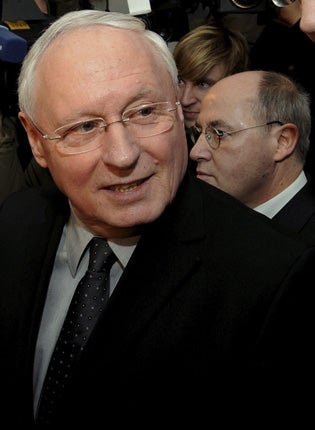German politics set for shake-up as cancer forces Red Oskar to quit

He has been called "the most dangerous man in Europe", but "Red" Oskar Lafontaine, veteran leader of The Left party in German, has announced plans to step down. And whatever risk he may have posed in the past, there is little doubt that his departure will reshape German politics – and pose a significant new risk to Chancellor Angela Merkel's right-wing government.
Mr Lafontaine, 66, declared at the weekend that he was resigning as The Left's leader and leaving parliament for good because he is suffering from cancer. His announcement followed weeks of speculation about his future.
"The cancer has come as a warning shot and I simply can't ignore it," he said. "I am a political person and this decision was not easy for me to make."
Yet his resignation not only marks the end of one of post-war Germany's most colourful and controversial political careers. For more than a decade, Mr Lafontaine has been the bogeyman of the mainstream centre-left Social Democratic Party (SPD). Yesterday there was speculation that with Mr Lafontaine gone, the Social Democrats' pragmatic new leader, Sigmar Gabriel, would soon form an alliance with The Left – a coalition that would pose a real threat to Angela Merkel's conservatives. "Gabriel will now be able to incorporate The Left. It is only a matter of time," remarked Der Spiegel magazine's website.
Before his defection, Mr Lafontaine enjoyed a meteoric career in the Social Democratic Party, culminating in his appointment as Finance Minister in Gerhard Schröder's government in 1998. But within months of being installed, Mr Lafontaine had a furious argument with Chancellor Schröder over economic policy and abruptly resigned. At the time The Sun newspaper in Britain, citing his left-wing policies, described him as "the most dangerous man in Europe". He left the party in 2005, and from then on he was regarded as a traitor within the SPD camp. Two years later the party was reformed as Die Linke or The Left.
Several SPD politicians suggested that the way was now open for greater co-operation with The Left. "From now on it's going to be more difficult for Ms Merkel's coalition to win elections," said Peter Lösche, a leading political scientist. "Without Lafontaine, the parties of the left will be able to join forces."
Subscribe to Independent Premium to bookmark this article
Want to bookmark your favourite articles and stories to read or reference later? Start your Independent Premium subscription today.

Join our commenting forum
Join thought-provoking conversations, follow other Independent readers and see their replies